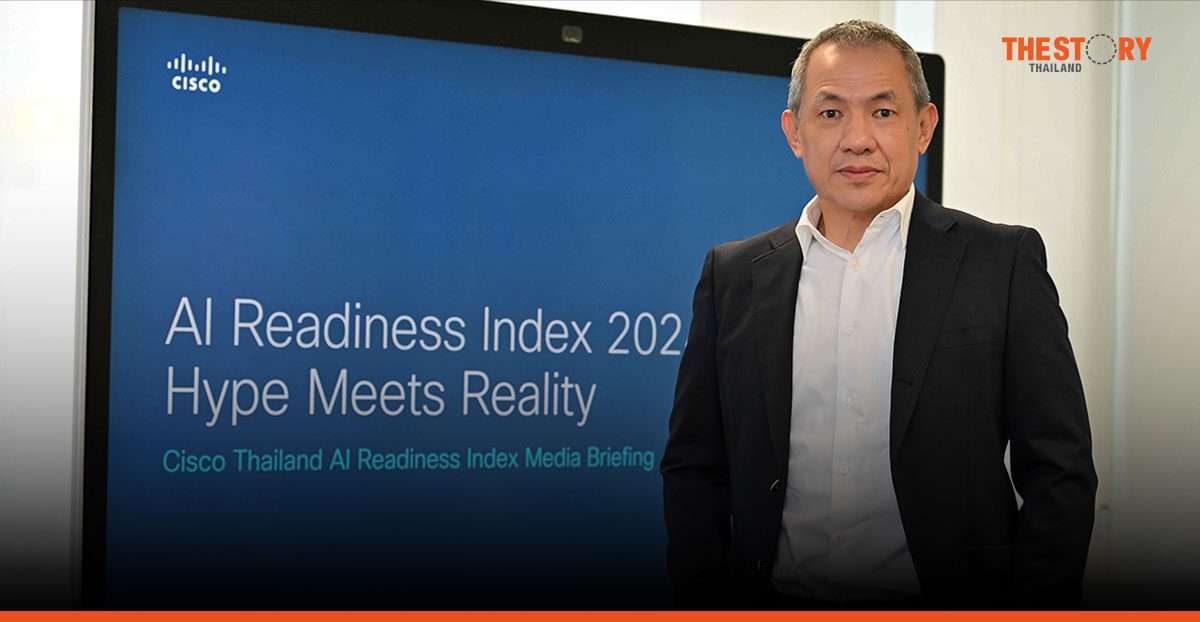Cisco announced findings from the Cisco 2024 AI Readiness Index. The index reveals that only 21% of organizations in Thailand are fully prepared to deploy and leverage AI-powered technologies, from 20% a year ago.
This underscores the challenges companies face in adopting, deploying, and fully leveraging AI. Given the rapid market evolution and the significant impact AI is anticipated to have on business operations, this readiness gap is especially critical.
The Index is based on a double-blind survey of 3,660 senior business leaders from organizations with 500 or more employees across 14 markets in APJC. These leaders are responsible for AI integration and deployment within their organizations. The AI readiness index is measured across six pillars: strategy, infrastructure, data, governance, talent, and culture.
Acting with Urgency
AI has become a cornerstone for business strategy, and there is increasing urgency among companies to adopt and deploy AI technologies. In Thailand, all companies (100%) report an increased urgency to deploy AI in the past year, driven primarily by the CEO and leadership team. Additionally, companies are committing a significant amount of resources towards AI, with 53% reporting that as much as 10% to 30% of their IT budget is being allocated to AI deployments.
Despite significant AI investments in strategic areas like cybersecurity, IT infrastructure, and data analytics and management, many companies report that returns on these investments are not meeting their expectations.
“As companies accelerate their AI journeys, it’s critical they adopt a comprehensive approach to implementation and connect the dots to link AI ambition with readiness,” said Weera Areeratanasak, Managing Director, Cisco Thailand.
“This year’s AI Readiness Index reveals that to fully leverage the potential of AI, companies need a modern digital infrastructure capable of meeting evolving power needs and supported with the right visibility to achieve their business objectives. It is equally important to make sure that all of this is built on a foundation of trust and responsible AI to power an inclusive future for all.”
Key Findings
AI Readiness flatlined across multiple pillars, with infrastructure identified as a pain point: Companies are tackling challenges in infrastructure readiness, with gaps in compute, data center network performance, and cybersecurity, amongst other areas. Only 33% of organizations have the necessary GPUs they need to meet current and future AI demands and 47% have the capabilities to protect data in AI models with end–to–end encryption, security audits, continuous monitoring, and instant threat response.
Companies are investing, but gains fall short of expectations: Over the past year, AI has been a priority spend for organizations in Thailand, with 53% allocating 10-30% of their IT budgets to AI projects. AI investments have focused on three strategic areas IT infrastructure (59% of companies are at full/advanced deployment), cybersecurity (45%), and marketing and sales management (43%). The top three outcomes they aim to achieve include improving efficiency of systems, processes, operations, and profitability; the ability to innovate and remain competitive; and creating a better experience for customers and partners.
Despite increased investments, on average 40% of respondents said they have either seen no gains or the gains have fallen short of their expectations, in augmenting, assisting, or automating current processes or operation.
Relentless pressure to succeed: There is mounting pressure and urgency from top leadership to implement AI technologies. Over half (59%) of companies report that the CEO and the leadership team are driving AI deployment, closely followed by middle management (49%) and the board of directors (44%). As the clock ticks, businesses in Thailand are accelerating efforts and increasing investments to overcome barriers and embrace AI-driven transformation. Notably, one-fifth (23%) of organizations plan to allocate more than 40% of their IT budget to AI investments in the next four to five years, a steep climb from 5% of companies who said they are allocating a similar portion of their IT budget to AI currently.
Companies recognize they need to do more to be better prepared to leverage AI effectively. Across Thailand, 57% rated improving scalability, flexibility, and manageability of their IT infrastructure as their top priorities highlighting an awareness of the gaps they that must be addressed to improve overall AI readiness.
Addressing Skills and Talent Gaps
Despite unique challenges within each pillar, there is a common theme that has emerged across the board – that of lack of skilled talent. Companies highlighted this as the top challenge across infrastructure, data, and governance underscoring the critical need for skilled professionals to drive AI initiatives.
10 healthcare technology trends for 2025
AFP partner with Mistral AI to enhance AI responses with reliable news content












